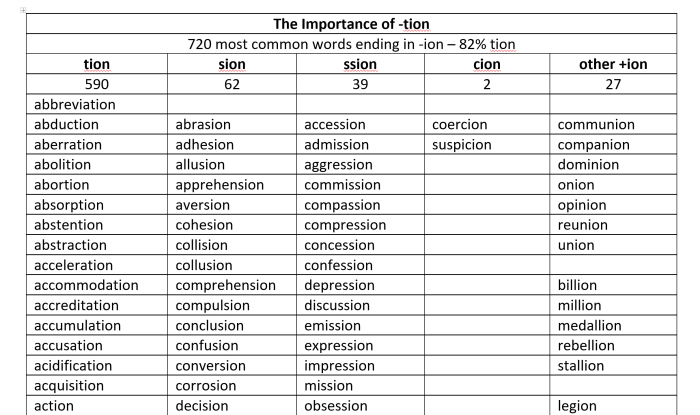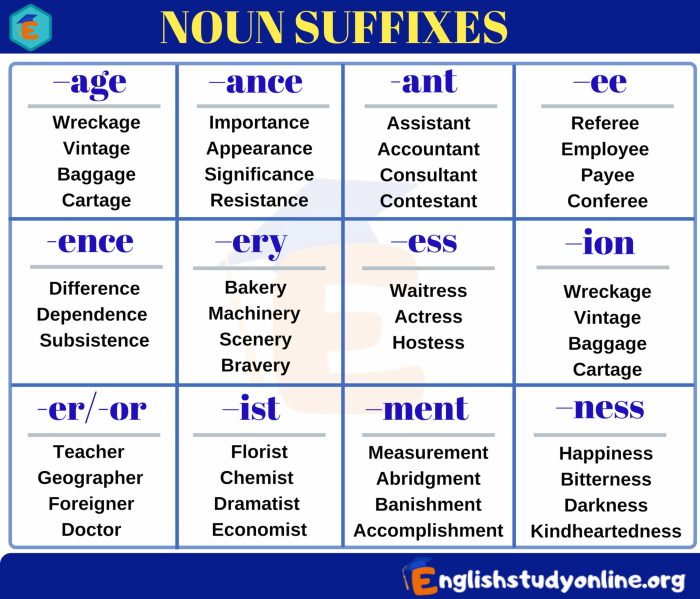Prepare to delve into the captivating world of words that end in cion, where precision and nuance intertwine. These words, rooted in ancient languages, possess a unique charm that invites exploration and discovery.
From their morphological structure to their semantic relationships, we will embark on a journey to unravel the secrets of these linguistic gems, uncovering their historical significance and exploring their usage in various contexts.
Definition and Etymology: Words That End In Cion

Words ending in “-cion” generally refer to the act, process, or result of something. They often convey a sense of action or condition.
These words have Latin or Greek roots, with “-cion” originating from the Latin suffix “-tio” or the Greek suffix “-σις” (-sis). These suffixes indicate an action, state, or result.
Amongst words ending in “cion,” the most frequently encountered one is “suspicion.” By the way, have you been searching for “nbme 11 answers step 2”? We’ve got you covered with the latest information here . Back to words ending in “cion,” another common word is “coercion.”
These terms are often used in legal and formal contexts.
Examples of Common Words
- Education
- Decision
- Connection
- Function
- Production
Morphological and Syntactic Patterns

Words ending in “-cion” exhibit a consistent morphological structure. They are typically formed by adding the suffix “-cion” to a verb root, thereby creating a noun. This suffix indicates an action, process, or state.
Syntactically, words ending in “-cion” can belong to various parts of speech. They can function as nouns, adjectives, or adverbs.
As Nouns
- Words ending in “-cion” commonly function as nouns. In this role, they denote an action, process, or state.
- For example, the word “decision” refers to the act of making a choice.
As Adjectives
- Words ending in “-cion” can also function as adjectives, describing a noun or pronoun.
- For example, the word “fictional” describes something that is imaginary or not based on reality.
As Adverbs
- In rare cases, words ending in “-cion” can function as adverbs, modifying a verb, adjective, or another adverb.
li>For example, the word “additionally” means “in addition” and modifies verbs or adjectives.
Semantic Relationships

Words ending in “-cion” often share a semantic relationship with their base words, indicating a state, process, or result. The suffix “-cion” generally modifies the meaning of the root word by adding a sense of action, condition, or consequence.
For example, the word “construction” is derived from the root word “construct,” which means “to build.” The addition of the suffix “-cion” transforms the meaning to “the act or process of building.”
Words with Similar Meanings
Many words ending in “-cion” have similar meanings, indicating a state or condition. Here are some examples:
- Desolation: a state of complete emptiness or abandonment
- Isolation: a state of being separated or alone
- Exaltation: a state of great joy or triumph
- Consternation: a state of great surprise or dismay
li>Humiliation: a state of being deeply shamed or embarrassed
Historical and Cultural Significance

Words ending in “-cion” have a rich historical and cultural significance. They trace their origins to the Latin suffix “-tio,” which denoted an action or state of being. Over time, this suffix was adopted into English and has been used to form a wide range of words denoting abstract concepts, conditions, or processes.
Cultural Contexts
Words ending in “-cion” have been used in a variety of cultural contexts throughout history. In literature, they have been employed to describe complex emotions, psychological states, and social phenomena. In art, they have been used to capture the essence of particular moments or experiences.
In religion, they have been used to express spiritual concepts and beliefs.
Notable Examples
- Fiction: The Great Gatsbyby F. Scott Fitzgerald explores the themes of love, loss, and the American Dream through its use of words like “ambition,” “corruption,” and “obsession.”
- Art:The painting “Guernica” by Pablo Picasso depicts the horrors of war through its use of words like “destruction,” “agony,” and “desolation.”
- Religion:The Bible contains numerous words ending in “-cion,” such as “salvation,” “redemption,” and “resurrection,” which express key Christian beliefs.
Usage and Stylistic Considerations

Words ending in “-cion” are generally formal and academic, commonly found in written rather than spoken language. They convey a sense of precision and specificity, making them suitable for contexts requiring a high level of accuracy and clarity.
Registers and Contexts
- Academic and Scientific Writing:These words are prevalent in academic papers, research reports, and scientific texts where precise language is crucial.
- Legal Documents:Words ending in “-cion” are often used in legal contracts, statutes, and official documents to express specific conditions and obligations.
- Formal Correspondence:In business letters, diplomatic communications, and other formal written exchanges, these words lend an air of formality and professionalism.
- Technical Writing:Words ending in “-cion” are commonly employed in technical manuals, engineering reports, and other documents where technical precision is necessary.
Stylistic Effects
- Formal Tone:These words contribute to a formal and authoritative tone in writing or speech, making them suitable for situations where a sense of seriousness and precision is desired.
- Emphasis on Precision:By using words ending in “-cion,” writers can emphasize the precise meaning and specific details of a concept or idea.
- Technical Language:These words are often associated with technical and specialized fields, conveying a sense of expertise and knowledge.
Appropriate Use, Words that end in cion
When using words ending in “-cion,” it’s essential to consider the context and audience. In general, these words are most appropriate in formal and academic settings where clarity and precision are paramount. However, they should be used sparingly in informal or colloquial contexts, as excessive use can make the writing or speech sound stilted and overly formal.
Questions and Answers
What is the significance of the suffix “-cion”?
The suffix “-cion” typically denotes an action, process, or state, and it often conveys a sense of result or consequence.
Can you provide examples of common words that end in “-cion”?
Certainly! Some familiar examples include “education,” “dedication,” and “function.”
